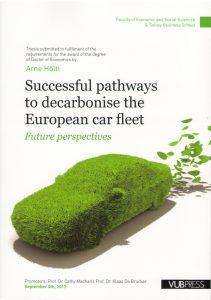
Under which conditions is the decarbonisation of the European car fleet sustainable? This thesis investigates whether and how more efficient vehicle technologies lead to more efficient and thus to lower anthropogenic emissions caused by car use. The CO2 intensity of car driving plays an important role in reaching the objective of reduced transport emissions by 2050. The analysis shows that energy and emission savings are possible through the application and further development of technologies such as advanced driver assistant systems (ADAS), electric vehicles (EVs) or intelligent transport systems (ITS). It requires supportive framework conditions in order to reach the desired decarbonisation impact, and the consideration of unintended effects when estimating the potential of technologies for increased energy efficiency.
The central goal of this PhD is to detect and analyse the links between driving demand, vehicle efficiency and energy use to arrive at a better understanding of ways to decarbonise car fleets. The thesis addresses this topic at several interrelated levels. At the driver level, it analyses the acceptance of drivers to use technology for energy efficiency. On the vehicle level it examines governmental actions to promote the deployment of efficient vehicles. The impact of vehicle efficiency on traffic demand and car emissions is assessed at a traffic network level. Different scenarios are developed and analysed in a final step by backcasting from the 2050 emission target to the present.
A thorough analysis of interrelations between driving demand, vehicle efficiency and energy use requires a multidisciplinary approach. Hence this thesis consists of different research techniques and relies on insights from several areas including travel demand modelling, technology acceptance theory or scenario analysis.
